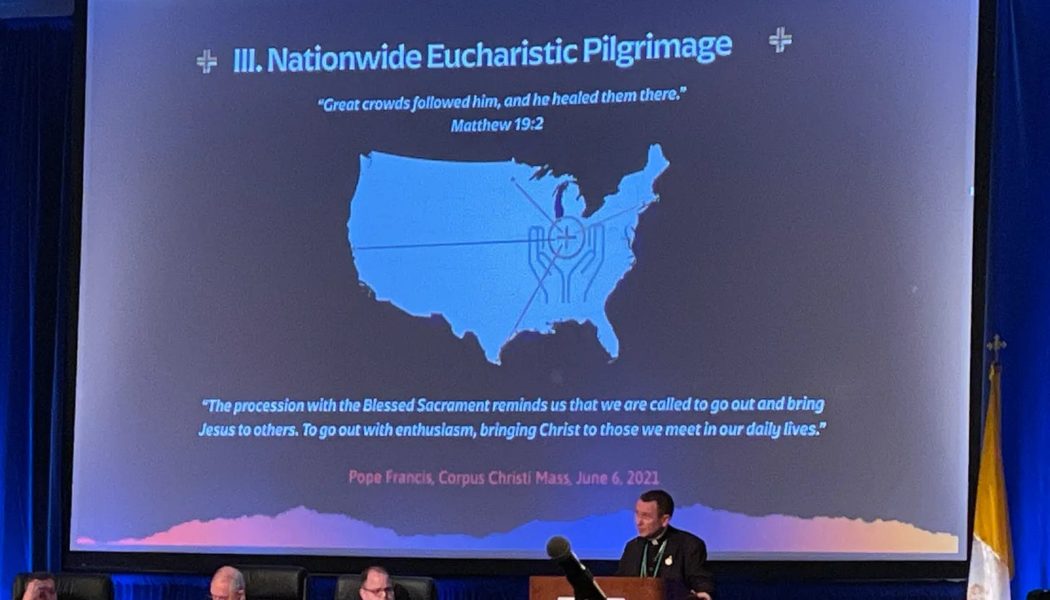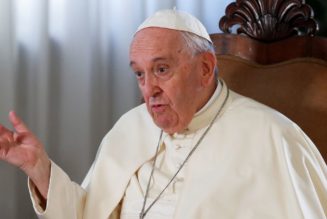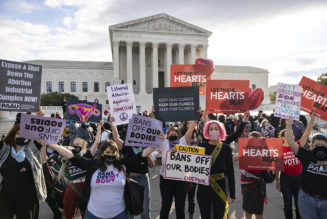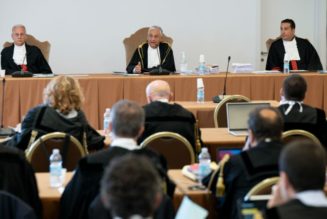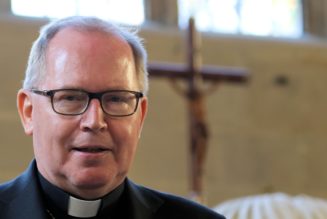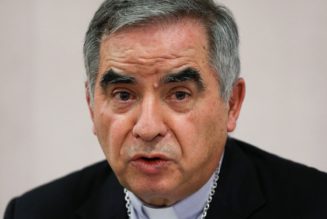The Archdiocese of Chicago is expected to restrict the exposition of the Eucharist during a national Eucharistic pilgrimage that will traverse the Chicago region next year, ahead of the Eucharistic Congress scheduled for next July.
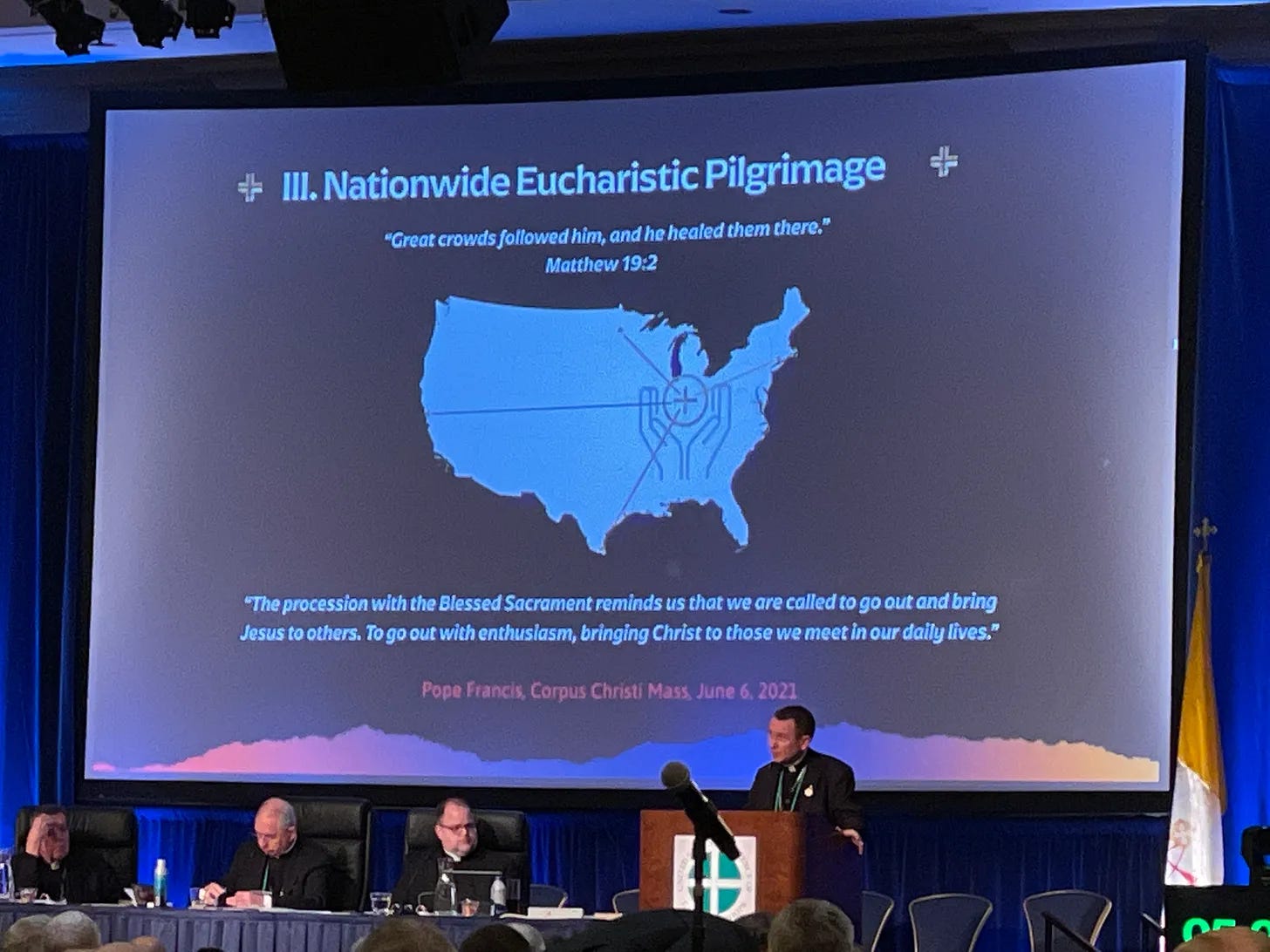
The anticipated restriction comes amid differences of emphasis and approach among U.S. bishops over the Church’s Eucharistic revival process, now underway, and the $14 million Eucharistic Congress planned for 2024 — especially over the revival’s emphasis on adoration of the Eucharist.
While Cardinal Blase Cupich has argued that an emphasis on adoration could distract from catechesis about the importance of the Mass, Bishop Andrew Cozzens has stressed a unified vision between Eucharistic adoration and the worship of God in the Mass.
—
According to three senior Church officials close to the Eucharistic pilgrimage, the Chicago archdiocese has told organizers of the Eucharistic pilgrimage that, while pilgrims may travel through the archdiocese during their processional walk to Indianapolis, they are expected to reserve the Eucharist in a ciborium, rather than process with the Eucharist exposed in a monstrance, as the pilgrimage will do in other areas of the country.
A source with knowledge of the pilgrimage planning said that when pilgrims traverse through Chicago in the summer of 2024, the archdiocese will conduct a Mass at Holy Name Cathedral, followed by a Eucharistic procession led by Cardinal Cupich — but that the Eucharist will otherwise be expected to be reserved as pilgrims travel.
“He told them they could go through Chicago, but they couldn’t expose the Blessed Sacrament while they were walking. That seemed to be the compromise that they got about coming at all,” according to one senior Church official, who spoke on condition of anonymity because he was not authorized to speak on the record.
Other officials close to the Eucharistic pilgrimage confirmed that account.
The 2024 national Eucharistic Congress is sanctioned by the U.S. bishops’ conference, but organized by an independent nonprofit formed for just that purpose, whose board of directors is chaired by Bishop Andrew Cozzens. Five other bishops sit on the nonprofit’s board, along with four laypeople.
While the Congress is expected to draw pilgrims from across the U.S., it will be preceded officially by four walking pilgrimages, organized by the Eucharistic Congress staff and by Modern Catholic Pilgrim, a San Diego based nonprofit with expertise in planning pilgrimages.
The four walking pilgrimages will begin in May 2024, commencing in San Francisco; at the tomb of Blessed Michael McGivney in New Haven, Connecticut; at the U.S.-Mexico border near Brownsville, Texas; and at the headwaters of the Mississippi River, in northwestern Minnesota.
They will conclude shortly before the Congress begins in Indianapolis next July.
Cozzens told The Pillar last year that the pilgrimages aim “to invite everyone; young people and whoever wants to pilgrimage with Jesus in the Blessed Sacrament across the country from four sides of the country, praying and seeking their own deeper walk with Jesus, as we process the Blessed Sacrament towards Indianapolis.”
Each pilgrimage will be anchored by a team of young adults committed to walking most of the pilgrimage route to Indianapolis, while sleeping at churches along the way, and traveling with a support van for logistics. Catholics will be invited to accompany the pilgrimage teams as they make their way by foot to Indianapolis.
Each team is expected to be accompanied by priests, many of them members of the Franciscan Friars of the Renewal.
Cozzens explained that the teams will partner with local dioceses to undertake major processions — “with the canopy and cross and servers and people singing hymns and praying and things like that” as they pass through cities along their routes.
But for the “miles on miles” outside of such cities, the teams will normally undertake either “a simple walking procession — a priest or a deacon carrying the Blessed Sacrament and a simple monstrance, but without a canopy and people walking prayerfully,” or they will process using a specially designed electric vehicle meant for publicly viewable exposition and adoration of the Eucharist, with pilgrims walking behind and alongside the vehicle.

Cozzens explained that in “places where there’s hundreds of miles with no people — when we’re going across the desert of Nevada, for example … we might repose the Blessed Sacrament or at least prayerfully carry it in a van while we’re going across the larger miles.”
But sources close to the pilgrimage told The Pillar that planners now expect they will also repose the Blessed Sacrament while walking through the Archdiocese of Chicago — after a decision on the matter from officials in the archdiocese.
Congress organizers declined to clarify directly their plans for the pilgrimage in the Archdiocese of Chicago, saying that the planning process is still underway.
In response to questions, Congress executive director Tim Glemkowski told The Pillar that: “The National Eucharistic Pilgrimage is working in close collaboration with staff in each of the 64 dioceses the pilgrimage route will pass [through].”
“Every segment of the pilgrimage will be a distinct experience of each local diocese that will highlight the holy sites, cultural experiences, and Eucharistic life of that local church. Each diocese is creatively engaged in the planning process to allow a unique experience of the pilgrimage throughout all four pilgrim routes,” Glemkowski added.
“The pilgrimage will be a powerful, once-in-a-lifetime witness of how Jesus Christ comes close to us and invites all to encounter him in the Eucharist. We could not be more excited to be moving forward with each of our diocesan partners in the planning and execution of this incredible opportunity for our Church in the U.S,“ he said.
The Archdiocese of Chicago has not responded to questions from The Pillar.
Church officials close to the pilgrimage, who were not authorized to speak on the record, described Cardinal Cupich as “opposed” to the Eucharistic pilgrimages — saying the cardinal has raised objections among bishops about the way the walking pilgrimages might be perceived.
“You’ve got to understand,” one official told The Pillar, “he’s reluctant to have this whole affair parading down the middle of his diocese.”
But while some bishops have spoken publicly to criticize the USCCB’s Eucharistic Revival project, or the costs associated with the 2024 Eucharistic Congress, Cupich has not been among them.
Along with other bishops, the cardinal has instead argued that current plans for the Eucharistic Revival focus too much on adoration and Eucharistic piety, and, for that reason could diminish a Eucharistic theology emphasizing the communal nature of Christian worship in the Mass.
The cardinal has written prolifically in recent years to propose his own vision for the Eucharistic Revival — and expressed concern about the role of Eucharistic adoration in the Eucharistic Revival project.
The cardinal published in 2022 a short book, “Take, Bless, Break, Share: A Strategy for Eucharistic Revival,” which addressed Eucharistic adoration.
“Eucharistic adoration is a legitimate development of piety in the Western Church with many benefits for those who engage in it,” Cupich wrote.
But “although there are many positive elements in Eucharistic adoration,” the cardinal added, it can engender “narrowness, and even distorted perceptions of the sacrament itself,” without sufficient catechesis, he cautioned.
Absent proper catechesis, he warned, “Eucharistic adoration can privatize one’s relationship to the sacrament and to the Lord himself, overlooking the communitarian dimension of Eucharistic worship, and our responsibility to engage with our community in an active way.”
Cupich has argued that the Church aims to see adoration take place in public liturgical events.
“The liturgical books that offer the pathway for adoration assume a community context — proclamation of the Word of God, perhaps some music, and a common gathering of the faithful for adoration.”
Absent that context is the prospect for excessive individualism, the cardinal argued.
“Although the prayer associated with adoration can and should be personal, it cannot be merely private and authentically Eucharistic at the same time,” he wrote.
“These concerns about Eucharistic adoration also apply to various forms of popular piety that have a Eucharistic dimension,” he cautioned.
According to senior sources close to the U.S. bishops’ conference, Cupich has expressed concern among other bishops that videos promoting the national Eucharistic Revival have placed too heavy an emphasis on Eucharistic adoration.
The cardinal’s concern — that the prospect that an emphasis on Eucharistic adoration might “distort” Catholic doctrine — has also been raised by Fr. Louis Camelli, Cupich’s delegate for formation and mission, and theological advisor, in the Archdiocese of Chicago.
In a March essay in America magazine, Camelli said that while a Eucharistic revival, “or perhaps a Eucharistic reset,” is needed in the Church in the U.S, he is “not confident that [the National Eucharistic Revival] will accomplish what it sets out to do.”
The priest lamented that “the heavy emphasis that [the Revival] places on eucharistic devotions, such as processions, adoration, Forty Hours and eucharistic miracles — as praiseworthy as these might be in themselves — does not capture the heart of the matter.”
“The real challenge is not to understand, appreciate and reverence the Eucharist as a sacramental object, which can be a real tendency of eucharistic devotions. No, the real challenge is to enter together the mystery of the Lord’s self-sacrificing love made present and communicated in the eucharistic action—take, eat, drink, do, remember. To enter that mystery is to find ourselves individually and collectively transformed into the very one we celebrate, Jesus who is present among us as our hope of glory,” Camelli added.
For his part, Cozzens has taken a different tack.
In 2021, Cozzens emphasized to The Pillar that “the source and the summit of our life is the celebration of the Eucharist, where we participate in Jesus’s perfect act of worship to the Father, which he did on the Cross.”
But the bishop said that adoration enhances a spirituality rooted in the Mass.
“As Saint John Paul II often said, and others, the Mass itself is not enough time to fully receive the gift of the Eucharist. That’s why we need times of adoration.”
Cozzens has also argued that adoration catalyzes Christian charity.
“We’re in a period in which people are experiencing the fruit of Eucharistic devotion: how it increases my love, and then how that changes me, and then how that changes the world,” the bishop told The Pillar.
“Spending time in adoration has an effect on my soul. A profound effect. Mother Theresa insisted that the most important thing she did in her community was to establish a daily Eucharistic holy hour of adoration every afternoon. And that was centrally important to giving the sisters the strength they needed to go out and serve the poor in radical ways, you know?”
Organizers of the Eucharistic Congress and pilgrimages have been reluctant to address directly the prospect of disagreement over the planned events.
In fact, Glemkowski told The Pillar that he believes the Congress and pilgrimages will unify Church leaders — and emphasized Cupich’s public support for the projects.
“The National Eucharistic Pilgrimage is a wonderful opportunity to overcome division in the Church and highlight our unity through the Eucharist and this Revival. Our team has been extremely pleased and grateful for our ongoing relationship with the Archdiocese of Chicago and for the support of Cardinal Cupich,” Glemkowski said.
Comments 45
Services Marketplace – Listings, Bookings & Reviews
